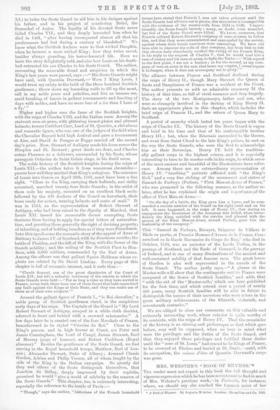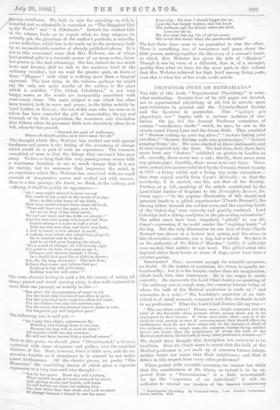MRS. WEBSTER'S "BOOK OF RHYMES."
Tim reader must not expect in this book the full thought and vigorous expression which he has been accustomed to find in much of Mrs. Webster's previous work,--in Portraits, for instance, where, we should say she reached the topmost point of her • A Book of Rhymes. By Augusta Wcbster. London : Macmillan awl Co. Mt.
jisterary excellence. We look in vain for anything so rich in /meaning and so admirable in execution as 'The Happiest Girl in the World" and "A Dilettante." Indeed, the modest title of the volume leads us to expect what, we may suppose, we actually get, the gleanings of the author's portfolio, a miscella- neous collection, which has to be made up to the necessary bulk by no inconsiderable number of already published pieces. It is not in this occasional verse that Mrs. Webster, one of whose best poetical gifts is a dramatic power of no mean order, shows her genius to the best advantage. She has, indeed, far too much taste and literary skill to sink to the mediocre level of the ordinary versifier ; but we read. the greater part, at least, of these " Rhymes " with what is nothing more than a languid approval. The best thing in the volume, perhaps we might say the only one quite worthy of the author, is the piece which is entitled, "The Oldest Inhabitant," a not very happy name, as the words are inseparably associated with semi-comic ideas. The main subject is one which has often been treated, both in verso and prose; in the latter notably by Lord Lytton, in Zanoni,—the lot of the man who has won or to whom has been conceded the gift of immortality, the joy and triumph of its first acquisition, the weariness and desolation that follows when its possessor finds how absolutely alone he is left, when he has passed,
"Beyond the goal of ordinance, Where all should pause, as is most meet for all."
The thought which Mrs, Webster has worked out with special freshness and power is the feeling of the monotony of change which would be a part of such an experience. The 'common complaint of man is that the things that surround hint pass away. To live so long that this very passing-away recurs with a wearisome iteration, to see so much change that it is not its variety, but its sameness that impresses the mind, is an experience which Mrs. Webster has conceived with no small amount of imaginative power and worked out with success. Here is a fine passage, the finest, we think, in the volume, and sufficing of itself to justify its appearance :— " Ah ! men might marvel to hear me say
The world of my youth is the world of to-day. Here, in this very home of my birth,
How they would answer from some old book, Thus and thus was the past; now look, Are we its they of the older earth,
We and our ways and the fields we plough ?' And the first.met gossip who knows but Now Counts changes a. score in half a year ; Tells me this was that, and there was here, A hall is burnt, a now market is made, A railway runs whore the school-boys played ; He is married and he is dead,
And he so rich goes begging his bread ; 'Tis a world of change,' be will soberly sigh. For point to his tale, why, and so say I;
Changes and chances enough, I deem, In a world that goes like a shifting dream ; But, oh, the long sameness! Ebb and flow; Billows that come, and billows that go!
Nothing is but will drift away, Nothing was but will come!"
The more obvious feeling in such a lot, the misery of seeing all things prized and loved passing away, is also well expressed in more than one passage, as notably in this :—
" But alas! for the numbness of wont on all, For the heart that has loved too often to prize, For the eyes that have wept too often for tears, For the listless feet and the careless ears, For the brain that has learned that to learn is vain, For forgotten joy and forgotten pain."
The following, too, is well put :—
" Do I pity that slight, ephernerons fly,
Whirling and resting there in the sun, Because his day will so soon be done ? All remains while his day remains ;
He will not have known that a rosebud wanes."
Next to this poem, we should place "Disenchanted," a lament, expressed with some eloquence and pathos, over the vanished Illusions of life. Here, however, there is little new, and the ex- pression, forcible as it sometimes is, is marred by not unfre- quent feebleuesses. Of the shorter pieces, we prefer "Her Memories," the concluding stanza of which gives a vigorous expression to a very true and wise thought :— •
" Not by her grave. Some day will I return, When sorrow keeps its wont unvexed by place, And, aitting on the turf beside, will learn To call before me there her waking face. Not that white face that slept, and took no trace Of ohange because I kissed it, nor for tears.
Some day : for now I should forget her so, Lose the fair happy woman, and but know The coldness and the silenee when she died.
Lose her all so,
My love that was my life of all for years, She loved this music when the pinewoods sighed."
The last three lines seem to us somewhat to mar the effect. There is something, too, of tenderness and grace about the little poems, making together the life-story of a woman's heart, to which Mrs. Webster has given the title of "Marjory." Though it was by verse of a different, that is, of a stronger, quality than what we have, for the most part, in this volume that Mrs. Webster achieved her high level among living poets,. even this is what few of her rivals could match.



































 Previous page
Previous page